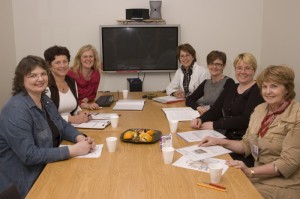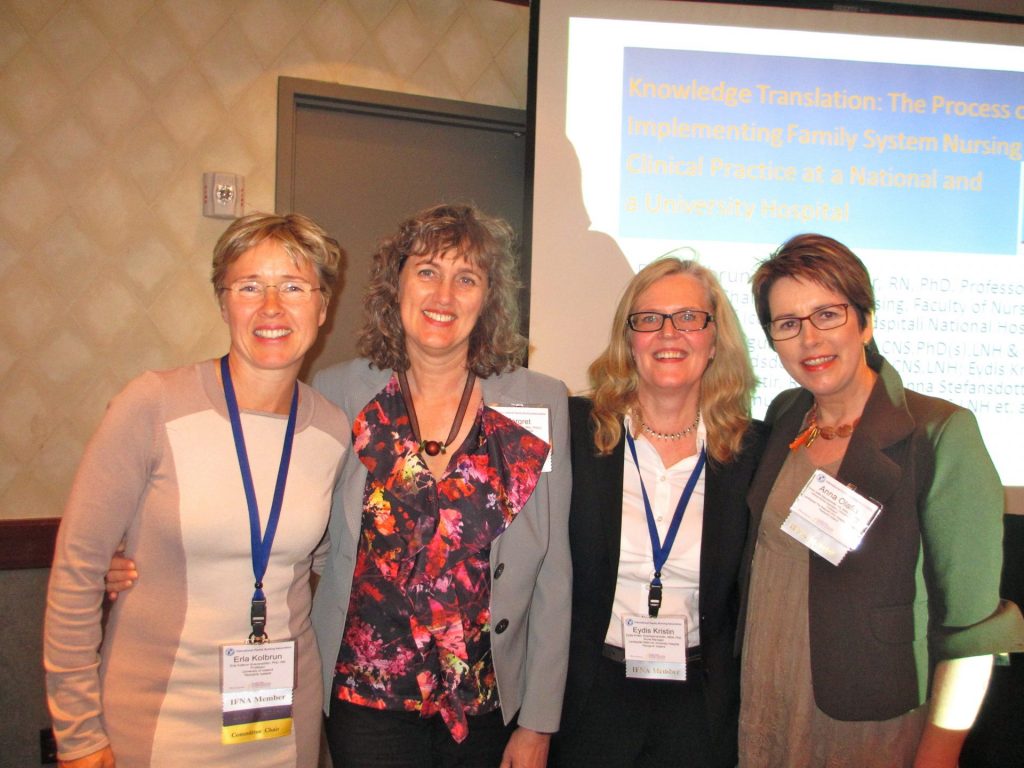

Iceland is a small country with a population of just over 300,000 and my Icelandic friends are among the most patriotic people I have ever met. They share a strong belief about the collective responsibility of Icelandic citizens to help their country grow in excellence. It comes as no surprise then that Family Systems Nursing has taken hold in Iceland in a major way through strong and courageous partnerships between academia and practice. My colleague, Erla Svavarsdottir, RN, PhD, Professor of Nursing at the University of Iceland, who is the leader of Family Systems Nursing in Iceland, completed her doctoral education with Dr. Marilyn McCubbin at the University of Wisconsin, Madison where she received an excellent grounding in the importance of families in health and illness. She returned to Iceland and decided to grow capacity in family nursing through several initiatives, including inviting Dr. Lorraine Wright and me to offer two intensive master’s level courses in June 2003 and June 2004 about the Calgary Family Practice Models (including CFAM, CFIM, and the Illness Beliefs Model) (Wright & Bell, 2009; Wright & Leahey, 2013; Wright, Watson, & Bell, 1996). We provided practical tools and skills focused on strengthening the nurse’s ability to offer family nursing interventions through therapeutic conversations with families about the family’s experience of illness and illness suffering. Many of the graduate nursing students who were enrolled in these courses assumed leadership positions in health care in Iceland and promoted the importance offering Family Systems Nursing through therapeutic conversations with families in practice settings.
As Erla described in a paper she wrote (Svavarsdottir, 2008), she had a conversation in 2006 with the Chief Nurse Executive, Anna Stefánsdóttir, of Landspitali University Hospital–about the need to implement family nursing theory in practice settings.
- It was toward the end of November 2006, at the time when we have the shortest day in Iceland, that the Chief Nurse Executive at the Landspitali University Hospital (LUH) in Reykjavik [Anna Stefánsdóttir] decided to implement family nursing at LUH. This decision was taken while Dr. Lorraine Wright, professor emeritus at the University of Calgary, was visiting Reykjavik to offer her third course on family nursing, suffering, and chronic illnesses to students in the graduate nursing program at the University of Iceland. In my mind, the Chief Nurse Executive’s decision was very brave, and when I asked her why she wanted to start working toward implementing family nursing in all the units at LUH, she responded, “This is what we need now for nursing in Iceland. What Dr. Wright has been introducing to our nurses over the past several years is an example of excellence in nursing. Offering excellent nursing service is what we need. We need to lift the spirit of our nurses”. And she continued, “Dr. Wright and her colleagues at the Family Nursing Unit, University of Calgary have developed the models, the concepts, and the tools that are needed in order to care for families. What we now need to do is to implement, at all levels, into our practice their wonderful ideas “ [Quote from Anna Stefánsdóttir] (Svavarsdottir, 2008, p. 456-457)
Thus began the ambitious and very courageous Landspitali University Hospital Family Nursing Implementation Project (2007-2011) of translating Family Systems Nursing knowledge into practice at an institutional level–on every unit of a large 900 bed university hospital! A Steering Committee of nurse leaders from practice and academic developed a plan of implementing and evaluating the family and nurse outcomes of offering practicing nurses an educational intervention that would enable them to practice family nursing and offer brief therapeutic conversations to families in every unit of the hospital. I had the pleasure of awarding Anna Stefánsdóttir, RN, MSc; Anna Ólafía Sigurðardóttir, RN, MS; Elísabet Konráðsdóttir, RN, MSc; and Eydís Kristín Sveinbjarnardóttir, RN, MSN, an Innovative Contribution to Family Nursing Award from the Journal of Family Nursing in 2009 for their courageous leadership in helping to implement this unprecedented knowledge translation project in an entire hospital (Bell, 2010).

The results of this carefully designed knowledge translation project are now beginning to appear in the published literature with Dr. Erla Svavarsdottir and her doctoral students, Eydís Sveinbjarnardóttir and Anna Ólafía Sigurðardóttir serving as co-authors of several of the research publications. The publications to date focus on small sample, randomized controlled studies of families who received therapeutic conversations from nurses during the hospitalization or out-patient care of a family member. A variety of families and illness concerns are represented in this data set. The publications also include the psychometric development of two new research instruments (see Sveinbjarnardottir et al. 2012a, 2012b) that measure family functioning and family perception of support from nurses–instrument items derived from the Calgary Family Assessment and Intervention Models (Wright & Leahey, 2013). Sustaining the change in practice is currently ongoing.
I am SO VERY PROUD of the advancement of family nursing that has been accomplished by my colleagues in Iceland and I hope that by reading these publications, others will catch a glimpse of what can be possible in family nursing knowledge translation when one has courageous vision, strong administrative support, and a team of clinically grounded nursing leaders who are educationally prepared and committed to grow capacity in family-focused care throughout a large healthcare system. This pioneering work is already providing the methods and tools for family nursing knowledge translation research in other places around the globe.
List of Current Publications related to Family Systems Nursing by Icelandic Family Nursing Scholars
Updated October 2020
Blondal, K., Zoega, S., Hafsteinsdottir, J. E., Olafsdottir, O.A., Thorvardardottir, A.B., Hafsteinsdottir, S.A., & Sveinsdottir, H. (2014). Attitudes of registered and licensed practical nurses about the importance of families in surgical hospital units: Findings from the Landspitali University Hospital Family Nursing Implementation Project. Journal of Family Nursing, 20(3), 355-375. https://doi.org/10.1177/1074840714542875
Gisladottir M., & Svavarsdottir E.K. (2011). Educational and support intervention to help families assist in the recovery of relatives with eating disorders. Journal of Psychiatric and Mental Health Nursing, 18(2), 122–130. https://doi.org/10.1111/j.1365-2850.2010.01637.x
Gisladottir, M., & Svavarsdottir, E.K. (2016). Development and psychometric testing of the Iceland-Family Illness Beliefs Questionnaire (ICE-FIBQ). Journal of Family Nursing, 22(3), 321-338. https://doi.org/10.1177/1074840716661593
Gisladottir, M., & Svavarsdottir, E.K. (2017). The effectiveness of therapeutic conversations intervention for caregivers of adolescents with ADHD: A quasi-experimental design. Journal of Psychiatric and Mental Health Nursing, 24(1), 15-27. https://doi.org/10.1111/jpm.12335
Gisladottir, M., Treasure, J., Svavarsdottir, E.K. (2017). The effectiveness of therapeutic conversation intervention among caregivers of people with eating disorders: Quasi experimental design. Journal of Clinical Nursing, 26(5-6), 735-750. https://doi.org.10.1111.jocn.13412
Gudnadottir, M., & Svarvarsdottir, E.K. (2014). Advanced nursing intervention for families of children and adolescents with asthma: The fathers perspective. Nordic Journal of Nursing Research, 34(2), 49-52. https://doi.org/10.1177/010740831403400210
Halldorsdottir, B., & Svavarsdottir, E.K. (2012). Purposeful therapeutic conversations: Are they effective for families of individuals with COPD? A quasi-experimental study. Vaard I Norden [Nordic Journal of Nursing Research], 103(32), 48-51. https://doi.org/10.1177/010740831203200111
Kamban, S., & Svavarsdottir, E.K. (2013). Does a therapeutic conversation intervention in an acute paediatric setting make a difference for families of children with bronchiolitis caused by respiratory syncytial virus (RSV)? Journal of Clinical Nursing, 22(19-20), 2723-2733. https://doi.org/10.1111/j.1365-2702.2012.04330.x
Konradsdottir, E., & Svavarsdottir, E.K. (2011). How effective is a short-term educational and support intervention for families of an adolescent with type 1 diabetes? Journal for Specialists in Pediatric Nursing, 16(4), 295-304. https://doi.org/10.1111/j.1744-6155.2011.00297.x
Konradsdottir, E., & Svavarsdottir, E.K. (2013). The role of the advanced nurse practitioners in offering brief therapeutic conversation intervention for families of children and adolescents with Type 1 diabetes. Vard I Norden, [Nordic Journal of Nursing Research] 33(1), 44-47. https://doi.org/10.1177/010740831303300310
Leahey, M., & Svavarsdottir. E.K. (2009). Implementing family nursing: How do we translate knowledge into clinical practice? Journal of Family Nursing, 15(4), 445-460. https://doi.org/10.1177/1074840709349070
NEW Petursdottir, A.B., Haraldsdsdottir, E., & Svavarsdottir, E.K. (2019). The impact of implementing an educational intervention to enhance a family-oriented approach in specialised palliative home care: A quasi-experimental study. Scandanavian Journal Caring Sciences, 33(2), 342-350. https://doi.org/10.1111/scs.12628
NEW Petursdottir, A.B., & Svavarsdottir, E.K. (2019). The effectiveness of a strengths-oriented therapeutic conversation intervention on perceived support, well-being and burden among family caregivers in palliative home-care. Journal of Advanced Nursing, 75(11), 3018-3031. https://doi.org/10.1111/jan.14089
Sigurdardottir, A.O., Garwick, A., & Svavarsdottir, E.K. (2017). The importance of family support in pediatrics and its impact on healthcare satisfaction. Scandinavian Journal of Caring Sciences, 31(2), 241–252. https://doi.org/10.1111/scs.12336
Sigurdardottir, A.O., Svavarsdottir, E.K., & Juliusdottir, S. (2015). Family nursing hospital training and the outcome on job demands, control and support. Nurse Education Today, 35(7), 854-858. https://doi.org/10.1016/j.nedt.2015.03.003
Sigurdardottir, A.O., Svavarsdottir, E.K., Rayens, M.K., & Adkins, S. (2013). Therapeutic conversations intervention in pediatrics: Are they of benefit for families of children with asthma? The Nursing Clinics of North America, 48(2), 287-304. https://doi.org/10.1016/j.cnur.2013.01.007
Svavarsdottir, E.K. (2006). Listening to the family’s voice: Nordic nurses’ movement toward family centered care. Journal of Family Nursing, 12(4), 346-367. https://doi.org/10.1177/1074840706294536
Svavarsdottir, E.K. (2008). Excellence in nursing: A model for implementing Family Systems Nursing in nursing practice at an institutional level in Iceland. Journal of Family Nursing, 14(4), 456-468. https://doi.org/10.1177/1074840708328123
NEW Svavarsdottir, E.K., & Gisladottir, M. (2019). How do Family-Strengths Oriented Therapeutic Conversations (FAM-SOTC) advance psychiatric nursing practice? Journal of Nursing Scholarship, 47(1), 5–15. https://doi. org/10.1111/jnu.12108
NEW Svavarsdottir, E.K., & Gisladottir, M., & Tryggvadottir, G.B. (2019). Perception on family support and predictors’ of satisfaction with the healthcare service among families of children and adolescents who are active in psychiatric treatment. Journal of Child and Adolescent Psychiatric Nursing, 32(1), 6-15. https://doi.org/10.1111/jcap.12220
NEW Svavarsdottir, E. K., Kamban, S. W., Konradsdottir, E., & Sigurdardottir, A. (2020). The impact of Family Strengths Oriented Therapeutic Conversations on parents of children with a new chronic illness. Journal of Family Nursing, 26(3), 269-281. https://doi.org/10.1177/1074840720940674
Svavarsdottir, E.K., Looman, W., Tryggvadottir, G.B., & Garwick, A. (2018). Psychometric testing of the Iceland Health Care Practitioner Illness Beliefs Questionnaire among school nurses. Scandinavian Journal of Caring Sciences, 32(1), 261–269. https://doi.org/10.1111/scs.12457
Svavarsdottir, E.K., & Sigurdardottir, A. (2005). The feasibility of offering a family level intervention to parents of children with cancer. Scandinavian Journal of Caring Sciences, 19(4), 368-372. https://doi.org/10.1111/j.1471-6712.2005.00360.x
Svavarsdottir, E.K., & Sigurdardottir, A. (2006). Developing family-level intervention for families of children with cancer. Oncology Nursing Forum, 33, 983-990. doi:10.1188/06.ONF.983-990
Svavarsdottir, E.K., & Sigurdardottir, A.O. (2011). Facilitating implementation of family nursing in general pediatric nursing practice: The circularity between knowledge translation and clinical practice. In E.K. Svavarsdottir and H. Jonsdottir (Eds.), Family nursing in action (pp. 161-184). Reykjavik, Iceland: University of Iceland Press.
Svavarsdottir, E.K., & Sigurdardottir, A.O. (2013). Benefits of a brief therapeutic conversation intervention for families of children and adolescents in active cancer treatment. Oncology Nursing Forum, 40(5), E346-E357. doi: 10.1188/13.onf.e346-e357
Svavarsdottir, E.K., Sigurdardottir, A.O., Konradsdottir, E., Stefansdottir, A., Sveinbjarnardottir, E.K., Ketilsdottir, A.,…Gudmundsdottir, H. (2015). The process of translating family nursing knowledge into clinical practice. Journal of Nursing Scholarship, 47(1), 5-15. https://doi.org/10.1111/jnu.12108
Svavarsdottir, E.K., Sigurdardottir, A.O., Konradsdottir, E., Tryggvadottir, G.B. (2018). The impact of nursing education and job characteristics on nurses’ perceptions of their family nursing practice skills. Scandinavian Journal of Nursing Sciences, 32(4), 1297-1307. https://doi.org/10.1111/scs.12573
Svavarsdottir, E.K., Sigurdardottir, A.O., & Tryggvadottir, G.B. (2014). Strengths-oriented therapeutic conversations for families of children with chronic illnesses: Findings from the Landspitali University Hospital Family Nursing Implementation Project. Journal of Family Nursing, 20(1), 13-50. https://doi.org/10.1177/1074840713520345
Svavarsdottir, E.K., Sigurdardottir, A.O., Konradsdottir, E., Tryggvadottir, G.B. (2018). The impact of nursing education and job characteristics on nurses’ perceptions of their family nursing practice skills. Scandinavian Journal of Nursing Sciences, 32(4), 1297-1307. https://doi.org/10.1111/scs.12573
NEW Svavarsdottir, E.K., & Tryggvadottir, G.B. (2019). Predictors of quality of life for families of children and adolescents with severe physical illnesses who are receiving hospital-based care. Scandinavian Journal of Nursing Sciences, 33(3), 698-705. https://doi.org/10.1111/scs.12665
Svavarsdottir, E.K., Tryggvadottir, G.B., & Sigurdardottir, A.O. (2012). Knowledge translation in family nursing: Does a short-term therapeutic conversation intervention benefit families of children or adolescents within a hospital setting? Findings from the Landspitali University Hospital Family Nursing Implementation Project. Journal of Family Nursing, 18(3), 303-327. https://doi.org/10.1177/1074840712449202
Sveinbjarnardottir, E.K. & Svavarsdottir, E.K. (2019). Drawing forward family strengths in short therapeutic conversations from a psychiatric nursing perspective. Perspectives in Psychiatric Care, 55(1), 126-132. https://doi.org/10.1111/ppc.12329
Sveinbjarnardottir, E.K., Svavarsdottir, E.K., & Hrafnkelsson, B. (2012a). Psychometric development of the Iceland-Expressive Family Functioning Questionnaire (ICE-EFFQ). Journal of Family Nursing, 18(3), 353-377. https://doi.org/10.1177/1074840712449204
Sveinbjarnardottir, E.K., Svavarsdottir, E.K., & Hrafnkelsson, B. (2012b). Psychometric development of the Iceland-Family Perceived Support Questionnaire (ICE-FPSQ). Journal of Family Nursing, 18(3), 328-352. https://doi.org/10.1177/1074840712449203
Sveinbjarnardottir, E.K., Svavarsdottir, E.K., & Saveman, B.I. (2011). Nurses attitudes towards the importance of families in psychiatric care following an educational and training intervention program. Journal of Psychiatric and Mental Health Nursing, 18(10),895-903. https://doi.org/10.1111/j.1365-2850.2011.01744.x
Sveinbjarnardottir, E.K., Svavarsdottir, E.K., & Wright, L.M. (2013). What are the benefits of a short therapeutic conversation intervention with acute psychiatric patients and their families? A controlled before and after study. International Journal of Nursing Studies, 50(5), 593-602. https://doi.org/10.1016/j.ijnurstu.2012.10.009
